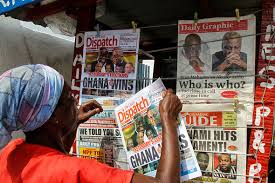The threat by the European Union to stop the purchase of cocoa from Ghana because of deforestation and child labour and the trip to Brazzavile, the Capital of the Republic of Congo by President Akufo-Addo to attend the swearing-in of that country’s President-elect are some of the trending stories in the Ghanaian press on Friday.
The Graphic reports that the European Union is threatening to stop the purchase of cocoa from Ghana because of deforestation and child labour.
The Deputy Chief Executive Officer of the Ghana Cocoa Board in charge of Agronomy and Quality Control, Dr. Emmanuel A. Dwomoh, said the EU had attributed the problem to cocoa farming, which unfortunately was not the case but illegal mining or galamsey.
The EU, which purchases about 80 percent of cocoa from Ghana, had indicated places which hitherto were covered with forest in the 70s and 80s but had been depleted.
Dr. Dwomoh made this known Thursday, April 15, 2021 when he presented a paper title “Illegal Mining in Cocoa Areas -The Position of Ghana Cocobod” at the National Consultative Dialogue on Small Scale Mining in Accra.
“Now they are threatening to sanction or pass a legislation that is going to prevent the EU from buying cocoa from Ghana. But we are engaging them,” he said.
“The EU position is that they are talking about child labour and deforestation and you see one key thing about deforestation is that in the 70s and 80s, if you take Amansie West for instance, the place was full of cocoa.
“Cocoa is always cultivated with economic trees so that economic trees are on the top of the canopies followed by cocoa itself and the under growth is always plantain, cocoyams and things like that,” he said.
The newspaper says that President Nana Addo Dankwa Akufo-Addo left Accra on Thursday for Brazzavile, the Capital of the Republic of Congo, to attend the swearing-in of that country’s President-elect, Denis Sassou Nguesso.
He is attending the event in his capacity as Chairperson of the Authority of Heads of State and Government of the Economic Community of West African States (ECOWAS).
The President was accompanied by the Minister of Foreign Affairs, Madam Shirley Ayorkor Botchway, and officials of the Presidency and Foreign Ministry.
Vice President Dr Mahamudu Bawumia will act in his stead.
He will return to Ghana on Friday, April 16, 2021.
The Graphic also reports that the European Union Election Observation Mission (EU EOM) to the 2020 general election has called for the establishment of a reasonable deadline for the ruling on parliamentary election petitions.
That, it said, would increase stakeholder access to an effective remedy and increase public confidence
“Parliamentary election petitions should be commenced within 21 days after declaration of results just like presidential election petitions,” it suggested in its final report on the 2020 presidential and parliamentary elections held on December 7, 2020.
The European Union deployed an EU EOM to Ghana between October 31 and December 30, 2020. In total, the mission comprised 80 observers from EU member states, as well as Norway, Switzerland and Canada.
The mission’s mandate was to assess the electoral process against international obligations and commitments for democratic elections, as well as the laws of Ghana.
The Constitution and PNDCL 284 provide that petitions concerning parliamentary elections must be commenced in the High Court within 21 days after the date of publication in the gazette of the result of the election.
Such petitions can be appealed at the Court of Appeal as the final instance.
The Times says that the Ministry of Finance says Ghana continues to be categorised as a ‘Lower-Middle Income Economy’ based on widely-recognised classification of the World Bank and the United Nations.
The Ministry, in a statement by its Public Relations Unit, said publications in the media that Ghana had been downgraded as a low income country by the International Monetary Fund (IMF), in accordance with its latest Fiscal Monitor, was incorrect because the IMF Fiscal Monitor did not classify countries by income levels.
In a statement, it said the IMF instead analysed latest public finance developments, updated medium-term fiscal projections, and assessed policies to put public finances on a sustainable footing.
The statement said the groupings of economies presented in the Fiscal Monitor’s Methodological and Statistical Appendix served an analytical purpose only.
“In this appendix, Ghana is conveniently categorised as a ‘Low-Income Developing Country (LIDC)’ like other lower-middle income economies such as Côte d’Ivoire, Kenya, Nigeria and others,” it said.
The statement said Ghana’s classification in the recent IMF Fiscal Monitor did not change and there was nothing like the country being downgraded.
Government had put in measures including the GH₵100 billion ‘Ghana CARES Obaatanpa’ programme to provide fiscal stimulus to drive growth and economic transformation post COVID-19 pandemic, it said.
The country was projected to maintain a positive economic growth of 0.9 percent in 2020, representing one of the few “pockets of resilience” on the continent, the statement said.
In 2021 and over the medium term, the Government expected GDP growth to average five percent with the deficit to decline to under five percent by 2024, it said.
GIK/APA


